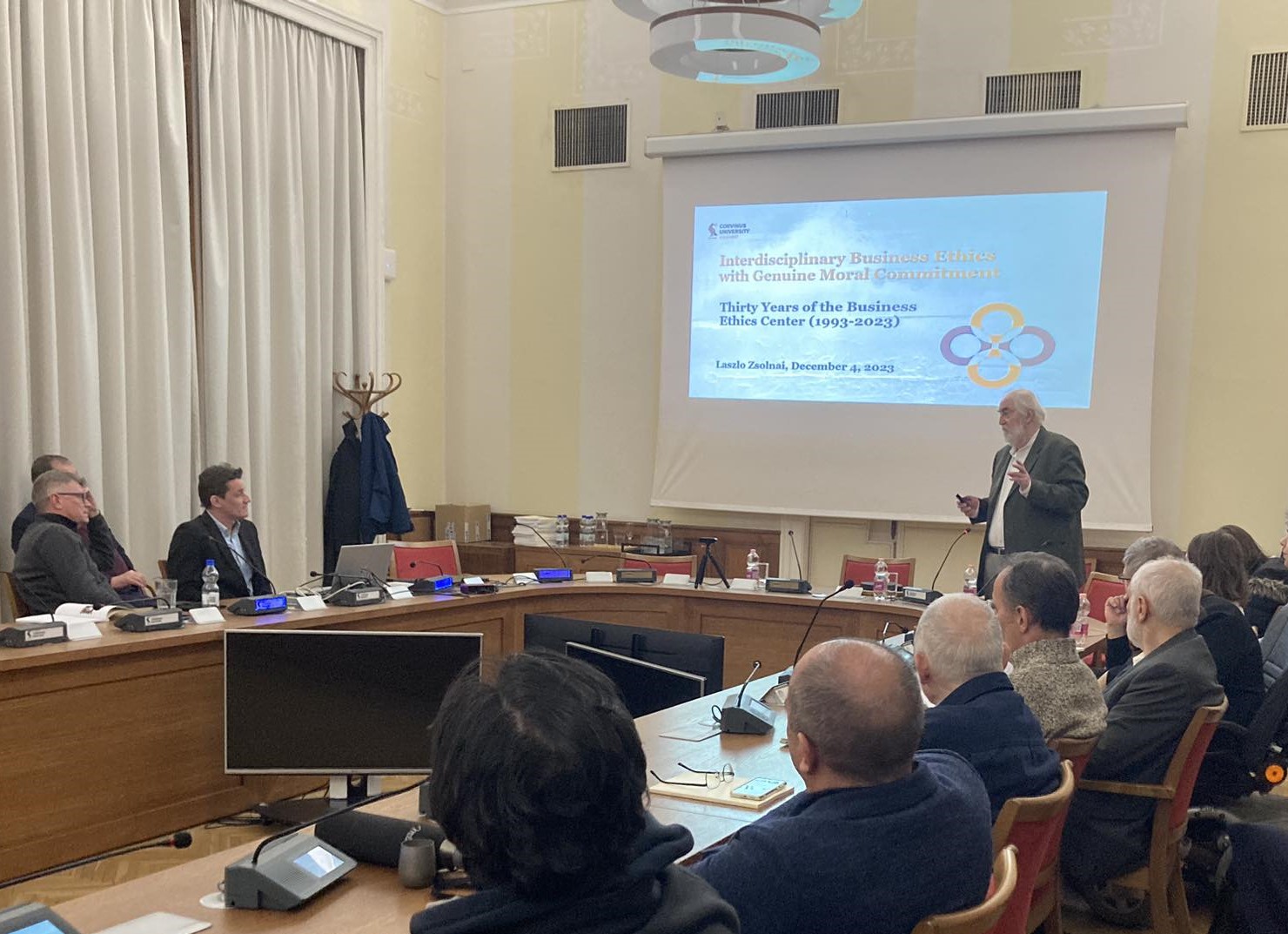“Flourishing of human and non-human life on Earth cannot be achieved by self-interested behaviour”

25 conferences and workshops in Hungary and abroad, 340 books and scientific publications, 123 newspaper articles and media reports in Hungarian, English and other languages – just a few of the many achievements from the last thirty years of the Business Ethics Center of the Corvinus University of Budapest.
In addition to scientific achievements, courses have been developed and taught by the center’s staff members in areas such as economic ethics, environmental ethics, business and sustainability, sustainable value creation, happiness and the economy, religion and economics, business spirituality and science and ethics.
This creed was formulated from the very beginning, when József Kindler, who died in 2010, and László Zsolnai, who still runs the Center, founded the Business Ethics Center in 1993.
“The functioning of the Center is based on the conviction that ethics is a relevant aspect of all levels of economic activity, from the individual and organisational to societal and global. Complex economic problems require, we believe, interdisciplinary approaches using models from economics, management, psychology, ecology and ethics,” says the thirtieth anniversary volume summarising the Center’s achievements.
Their work is therefore not only in the field of economic ethics, but also in the interface between environmental and religious ethics. “The Center is an action-oriented scientific inquiry where normative and descriptive elements are intermingled,” summarises their academic vision in the publication.
To celebrate its rich history, a birthday conference was also organised in December 2023, opened by Zoltán Oszkár Szántó, Dean of the Corvinus Institute for Advanced Studies (CIAS), which has been the organisational head of the Business Ethics Center since July 2022.
After the opening, Mike J. Thompson, Director of the London-based Anthesis Group gave a lecture entitled “Wise governance for sustainable performance and stakeholder capitalism”, followed by a presentation by László Zsolnai on the achievements of the Business Ethics Center so far and its future plans.
“Long-term success only comes through sustainability”
Business interests and environmental-social sustainability seem to be at odds. This was the dilemma that Mike J. Thompson tried to resolve in his lecture on wise governance, wise leadership. Previously, he worked in consulting firms, where he met more than 1,500 clients, and has taught in several university programs around the world, including China and Canada. What they all had in common was that they looked for ways to create value that would last.
According to Thompson, “long-term success only comes through sustainability”. This requires the company to create value for all stakeholders. This is not an easy task, of course, because it is necessary to satisfy often conflicting interests, such as shareholders, media gatekeepers, consumers and employees. This requires what he calls “wisdom”.
By this, Thompson was referring to the Aristotelian concept of “phronesis”, or practical wisdom. People need not only theoretical knowledge in life, but also practical wisdom to help them make the right decisions and live virtuously. This practical wisdom can be applied to all aspects of life and helps individuals understand how to live a happy and balanced life.
The emergence of ESG thinking in the business scene – the consideration of ethical, social and governance issues – is also a trend that Mike Thompson says is becoming increasingly important in evaluating corporate performance. Today, companies are increasingly at risk if they do not take into account their ethical, social and environmental impacts and do not adequately address all stakeholders, including nature.
Spirituality and genuine altruism play an important role in sustainability
The ethics of the economy and business scene are therefore also important for long-term success. According to the research conducted by the Business Ethics Center so far, the ethicality of economic behaviour is determined by two main factors, the moral character of the actor and the relative costs of ethical behaviour, as already mentioned by László Zsolnai after a brief presentation of the history of the Center.
In terms of moral character, it was found that actors who are inherently committed to the common good and define success in multi-dimensional terms tend to serve nature, society and future generations. In this reflection, spirituality can play a mayor creative role when it comes to economic decisions and actions.
The research centre is working on several projects on sufficiency-oriented, community-based economic models, which are essential for achieving a stable, sustainable Earth-human system. This, however, also implies that, according to László Zsolnai, only a non-materialistic value orientation can create real material well-being for people.
“Flourishing of human and non-human life on Earth cannot be achieved by self-interested behaviour. It requires to employ genuine, altruistic actions both in short-term and long-term,” summarises the results of thirty years of research.
Future plans for the center include hosting the international conference “Spirituality & Business in the Anthropocene” in Budapest in June 2024, and also partnering with the Bodo Cultural Capital of Europe 2024 project in Norway.
International research collaborations continue, with partners including Oxford University, Princeton, Penn State, Concordia, WU, Berkeley and Columbia.
The staff members of the Center is involved in the Pope Francis’ “The Economy of Francesco” programme and the UNESCO’s Economic Peace project, but also in the launching and continuation of research projects such as Spiritual Capital, Moral Leadership & Entrepreneurship, Indian Ethos in Management, among others, models of Community Economy, Disability as an Opportunity for Human Development, Veganism in Business & Society, Happiness in Organizations & Communities, Accounting for Intrinsic Value, Planet Positive 2030, Aboriginal Worldviews for Ecological Regenerations, Development of Transdisciplinary Knowledge and The University in the Anthropocene.
The 30-year summary volume of the Business Ethics Center can be downloaded from the following website: https://www.businessethicscenter.com/30-years-of-the-business-ethics-center/
Author: Máté Kovács
Picture attached: László Zsolnai gives a presentation on the 30th anniversary of the Business Ethics Center